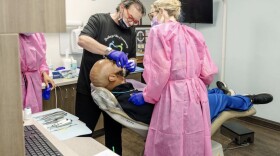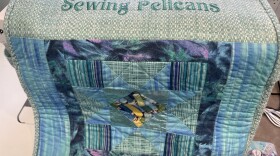Clyde Butcher may be 100-pounds lighter and admits he's taken his walker where no walker has gone before, courtesy of his 2017 stroke, but the black-and-white photography he is world-renowned for remains unchanged — simply eye-catching and gorgeous.
A sampling of that work is now on display at the Marco Island Historical Museum in an arresting exhibit of his 2002 journey to Cuba, Cuba: The Natural Beauty, through April 29, 2023.
Asked about that 2002 excursion, Butcher said it allowed him to photographically graze over the entire island.
"Well, the first trip, we did the eastern part. The second trip, we did the middle. Last part we did the west," he said.
That trip came after the United Nations declared 2002 as the Year of the Mountains. Butcher was invited by the ambassador to Cuba from the United Nations to photograph the mountains for a conference being held in Sierra Maestra.
What also drew Butcher to Cuba and what pleased him about the landscapes and scenery was its unadulterated condition.
"I love landscape that hasn't been manipulated, and it was really almost overpowering me," he said. Butcher then pointed to a photograph of a royal palm at the exhibit, expressing that manipulated trees, plantings of groups of two or three, were not his thing.
"You see a Royal Palm here ... you know, not threes, or twos. And you know here you have to plant trees (in) odd numbers. So, I can tell a forest has been manipulated by man."
The places he, his wife Niki, and Cuban guides hiked stood out to Butcher, so-much-so that he said at times he felt like he was in another world.
Placards that grace each photo in the Marco Island Museum's exhibit give details on what transpired, the conditions during the shoot, weather, surroundings, and much more.
And a couple of photographs in the series show Butcher's dedication to his craft.
One of the sites they were taken to, the area where Castro had his secret rebel camp, stands out to Butcher.
"Oh, yeah ... that's that's the trail to Castro's camp, where he invaded Cuba," he said, pointing to a photo, and then proceeding to tell why he and Niki never did make it to that site.
"Well, this was just after a rain. And it was really washy and everything. We got halfway there to where his camp was and the guide says, 'well, you realize you can't take pictures'," he said, adding he then told the guide, "okay, let's just turn around, go back."
Butcher said he wasn't going to just talk a hike, through muddy slippery conditions, and NOT be able to take photos.
"But I got some nice shots," he did concede. "Nice shots on the trip."
On another excursion in Cuba, Butcher and his wife were in the back of an old Russian-made truck laboring up a steep hillside roadway when they came upon a landscape that he just had to shoot. The driver, worried the truck would not handle standing still on the sharp incline, cautioned Butcher that it might start rolling backward.
Butcher, who had set up his large-format camera in the bed of the truck and watched as his wife clambered off the vehicle, simply shrugged about the possibility of the truck lurching downhill and said, "we'd just have to wave bye-bye."
More about Clyde Butcher
- Continued recovery from a stroke
- Clyde Butcher's Photographs: A Lesson In Patience
- About his photography
The stoke Butcher suffered in 2017 hasn't kept him out of the swamps and landscape area's he's known to frequent in Southwest Florida. The walker that the 80-year-old photographer now incorporates figures in nicely.
"I take my walker where no man has taken the walker before," Butcher joked. "I've had the water up toward the side. Yeah. So, it gets to be out there. And it's really been a saver for me mentally getting out there and doing my work. I mean, I think since my stroke I may have photographed more than before."
He said the 100 pounds he's lost since the stroke is a positive — "That's, that's a good thing. So yeah, that helped" — but he admitted that his knees remember his heftier self.
"My knees know the difference, that extra 100 pounds. I shouldn't have been wearing for that many years," he said. "I carry that camera with everything. All the gear is 100 pounds. And I used to carry that in the swamp."
Since Southwest Florida is his photographic stomping grounds, Hurricane Ian had an effect on Butcher's photo plans.
"It really was a bummer. I had this whole trip planned, photography trip to the central part of Florida and Myakka," he said. "My favorite tree didn't get mowed down though. But the moss blew off of it, has a whole different feeling now, yeah."
Butcher was happy, though, that his Big Cypress Gallery, in the middle of a cypress swamp and completely covered with trees, fared very well.
"We've had, like, four eyes of hurricane go over the gallery and nothing happens," said Butcher. "That's well built. Well, the trees protect it." He explains that the coral rock foundation of those trees is what helped them protect the gallery. "Nice anchor. The roots grow in that coral and they're in there, they're not going down."
And Butcher, always looking, always on the prowl for a good photo, has been successful, despite Ian's destruction.
"I got a good shot back on January 1," he said. "So you can always find something, if you're looking. I got some great shots at the swamp a month ago."
As for going back to Cuba again, Butcher said that likely wasn't going to happen.
"I'm not physically able to do it. I don't think," he said. "It's rough terrain."
But, like any good artist, Butcher is always interested in something new and different. In his case, it's infrared photography.
"You know, I'm 80-years-old and starting a whole new career," Butcher said. "I was actually watching YouTube on this guy in England, he just got an infrared camera. I said that looks like fun."
To Butcher, the chance to work with photography in a new medium was a no-brainer type affair.
"Why wouldn't you want to go out there looking for what's happening," he said. "I mean if you're stuck on film, that's fine. Thing I don't understand about film, people want to shoot film and they make digital prints with it. What's what's the point? Yeah, I don't understand that one."
Butcher said he hopes his photos of Cuba brings a smile to people's faces and, possibly, an awareness of the shape the world is in now.
"Cuba is a natural,. beautiful place," he said. "The whole world is a beautiful place. But it's in dire danger now. And Cuba is one of the few places not in dire danger."

IF YOU GO
Butcher's exhibit is part of the 2023 ¡ARTE VIVA! festival celebrating the rich and diverse Hispanic and Latin cultures and biodiversity. The Marco Island Historical Society joins with other Southwest Florida ¡ARTE VIVA! participants as a partner in this cultural celebration.
The Marco Island Historical Museum is located at 180 S. Heathwood Drive. Open Tuesday through Saturday, 9 a.m.-4 p.m. Admission is free. For information, call 239.389.6447 or visit www.theMIHS.o
WGCU is your trusted source for news and information in Southwest Florida. We are a nonprofit public service, and your support is more critical than ever. Keep public media strong and donate now. Thank you.


























